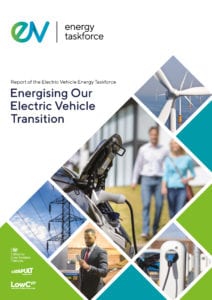A government advisory body has said that an uptake in EVs could be beneficial to the UK’s energy system.
According to the Electric Vehicle Energy Taskforce (EVET), an effectively managed integration of EVs with the energy system can significantly improve electricity network efficiency, increase system resilience and limit the requirement to build costly new infrastructure to meet growing electricity demand.
The EVET was established in 2018 to make proposals to government and industry to bring together the auto and energy sectors to ensure that the country’s energy system is able to accelerate the mass take-up of EVs while also delivering benefits to the electricity system.
The EVET claims that while the infrastructure spending required to prepare the UK electricity networks for the EV transition is likely to run to tens of billions, this cost can be significantly reduced if the right decisions are made and the transition is effectively coordinated between government and key energy, infrastructure and transport industry stakeholders.
A report published by the EVET puts forward 21 proposals for actions to be taken by government and industry to enable an “effective and efficient electric mobility transition”. These include:
– Providing financial incentives to EV drivers to ensure that the potential energy storage capacity of millions of EVs is used to reduce peak demand;
– Prioritising greater standardisation across the charging network to ensure it works resiliently, efficiently and securely with the electricity system;
– Establishing an independent body to promote the benefits of smart charging through a major publicity campaign to ensure EV drivers are confident and well informed;
– Extending the principle of ‘open data’ in the energy system to include EV charge points and EVs to allow more effective smart charging of EVs;
– Co-ordinating energy and transport planning to ensure the right infrastructure in the right place.
The report also states that “the transition to electric motoring is now well under way”, but that the pace must increase.
According to the EVET, road transport accounts for 28% of the UK’s total energy consumption and 25% of carbon emissions.
Philip New, chief executive, Energy Systems Catapult, and EVET chair, said: “Ensuring that the mass roll-out of EVs delivers benefits for both drivers and the wider energy system requires actions from industry, government and the regulator, including creating the new markets and policies that can unlock EVs’ huge potential.”
The EVET believes that coordinating the introduction of a smart charging infrastructure will enable network operators to balance demand and supply through an electricity grid increasingly incorporating intermittent renewable energy sources.
Therefore, the EVET claims that EV drivers willing to charge their vehicles during periods of low electricity demand or when surplus renewable energy is being generated will benefit from lower fuel costs in the transition ahead.
Three more recommendations within the report relate to the correct use of consumers’ personal data and the means to ensure people’s privacy is properly protected and smart EV charging is secure.
The EVET’s ‘Energising Our Electric Vehicle Transition’ report can be downloaded here.






